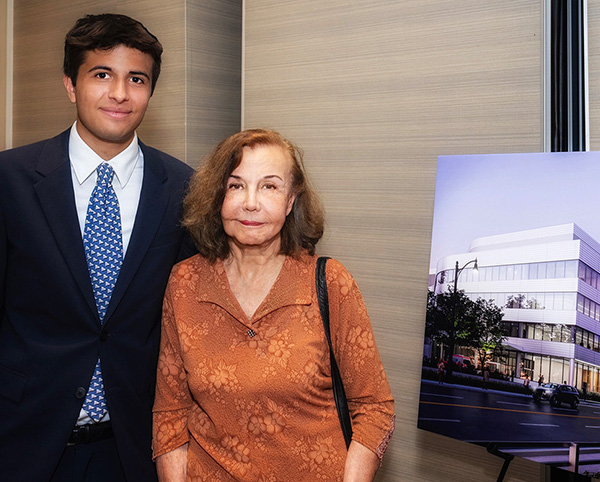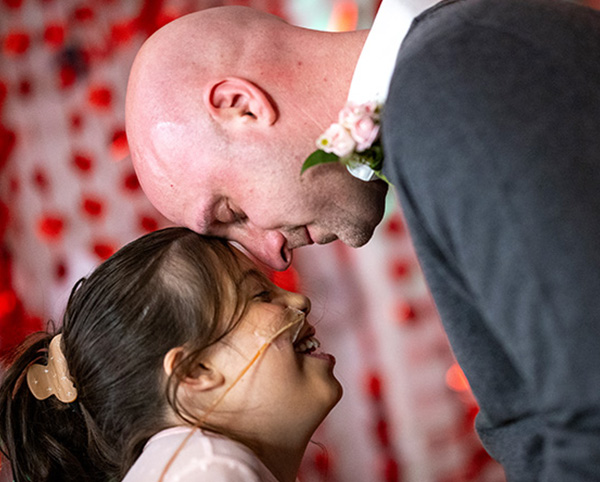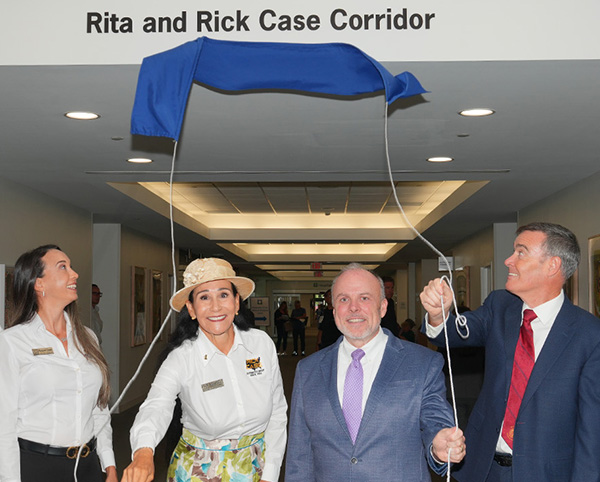Cleveland Clinic Physician Family Supports Research

Advancing treatment for cancer and neurological disease are personal priorities for Keyhan Mobasseri, MD, whose late husband, Jafar Mobasseri, MD, experienced both.
Dr. Jafar Mobasseri, the former Director of Radiology at Hillcrest Hospital, was diagnosed in 2011 with ureter cancer and treated at Cleveland Clinic’s Glickman Urological & Kidney Institute. The treatment brought about a rare case of encephalopathy, which cascaded into Alzheimer’s disease.
Before his death in 2019, the Mobasseris established the Dr. Keyhan and Dr. Jafar Mobasseri Endowed Chair for Innovations in Cancer Research.
In June, Dr. Mobasseri made an additional $1 million pledge to Cleveland Clinic Neurological Institute to support research and education projects in Alzheimer’s disease and related brain disorders.
During her husband’s treatment, she transitioned from Ob/Gyn to family medicine and cared for patients with cancer and neurological disorders. She understood.
“I was seeing many young people in my practice who were also coming to Cleveland Clinic for cancer treatment, and it was so upsetting,” Dr. Mobasseri says. “I’ve seen the way cancer and neurological disease impacts individuals and families.”
Filling Gaps in Cancer Research
Dr. Mobasseri believes the chair helps fill a vital funding gap to provide tools, infrastructure and innovative technologies to make an immediate and practical impact.
This fall, the appointment was granted to Feixiong Cheng, PhD, Director of the Cleveland Clinic Genome Center. His work centers on the genetics and genomics of Alzheimer’s and leveraging artificial intelligence (AI) to better diagnose and treat patients with the disease. His recent AI-aided research indicated some cancer drugs can be repurposed to treat Alzheimer’s.
Dr. Mobasseri speaks to efforts to personalize cancer treatment and Dr. Cheng’s innovative research utilizing AI to advance findings. When she and her husband established the endowed appointment, she said, “I hope that establishing this chair will inspire other physicians to give to Cleveland Clinic as well.”
Supporting Neurological Disease Discovery
Dr. Mobasseri’s gift to the Cleveland Clinic Neurological Institute is also fueled by passion and purpose.
“My husband and I have lived full lives, but I couldn’t stand to see my young patients suffer and experience the impact these diseases have on individuals and families,” says Dr. Mobasseri.
The Mobasseris emigrated from Iran to the United States in the mid-1960s. Both attended Shiraz University of Medical Sciences.
Dr. Keyhan Mobasseri describes the tough road to entry into medical school in Iran. “Two thousand people went for the entrance exam, but they accepted only 45,” she says. “When I passed the exam, I cried for two hours. It was the happiest day of my life.”
Settling in Cleveland, Dr. Jafar Mobasseri, a radiologist, completed his residency at Cleveland Clinic. He eventually became Director of Radiology at Hillcrest Hospital, where he pioneered the balloon catheter as a surgical alternative for unblocking arteries. Dr. Keyhan Mobasseri practiced at the former Huron Road Hospital.
Their medical careers evolved through the decades. In 2017, they were inducted into the 1921 Society, which honors donors who have made cumulative lifetime gifts of $1 million or more.
Dr. Keyhan Mobasseri continues seeing patients at Broadway Health Center in Cleveland but is set to retire in June 2026. Meanwhile, the Mobasseri family medical legacy continues with her daughter and son-in-law, both physicians, and her grandson Alex, who is completing pre-med at Case Western Reserve University School of Medicine and serving as a research student at Cleveland Clinic under Samir Kapadia, MD.
Dr. Mobasseri says she is committed to forwarding Cleveland Clinic’s mission to drive transformative innovations that shape the future of medicine, particularly in cancer and neurological research.
“Seeing so many young people suffering from different neurological problems,” she says, “I really wanted to find a way to make an impact and improve quality of life.”
Creating Joyful Moments with a Catalyst Grant

Childhood is shaped by memorable moments, like birthday parties, school dances and graduations. But for some pediatric patients at Cleveland Clinic Children’s, long hospital stays and serious illnesses mean missing out on those important life events.
Fortunately, Cleveland Clinic is home to many exceptional caregivers, and among the most dedicated are its Child Life Specialists and Creative Arts Therapists. These compassionate caregivers work tirelessly to bring comfort, joy and a sense of normalcy to children during treatment.
Child Life Specialists already go above and beyond to make the experience feel a little more like home. But Caitlin Wolf, MS, CCLS, saw an opportunity to do even more. Together with her co-applicants, Meredith McCulloch, MA, art therapist, and Jordan Oldham, CCLS, Child Life Specialist, she pursued a Catalyst Grant to turn that vision into reality.
“So much is taken from these kids when they're in the hospital,” says Caitlin. “So many things happen to them that are out of their control. The funding allowed us to give these experiences back to them, helping them to feel like kids again and not just patients.”
Thanks to this initiative, countless moments have been created for patients at Cleveland Clinic Children's. Ava Cooper shared a father-daughter dance in a Valentine’s-themed hospital room. The team decked out Evan Lallo’s hospital room with Cleveland Cavaliers-themed items and Fatheads of players to commemorate the completion of his 14 cycles of chemotherapy. Other special touches include recordable story books where parents can record their voice and scrapbooks filled with Polaroid pictures and personalized notes from caregivers.
“The Catalyst Grant helped make those things happen,” says Caitlin. “It allows families to feel seen and cared for in ways that go beyond traditional medicine. Yes, we’re giving these kids the best medical care, but we’re also helping care for their families as a whole. That’s what this work is really about.”
Catalyst Grants are funded annually by thousands of gifts of all sizes from donors. The competitive grants are awarded to caregivers with ideas to improve the lives of Cleveland Clinic patients, the organization and communities around the world. Caitlin was awarded about $35,000.
“We absolutely would not have been able to do a lot of it without the Catalyst Grant,” says Caitlin. “It’s made a powerful impact. Every kid, every family—even those facing the same diagnosis and treatment—experience their journey in a completely different way. This support allowed us to celebrate them and their milestones.”
Generous Gift to Weston Hospital Continues Legacy of Case Family

Cleveland Clinic Weston Hospital received a $2 million gift from philanthropist Rita Case, President and CEO of Rick Case Automotive Group.
The contribution will support research, education, patient care, programmatic and capital needs.
“We are deeply grateful to Rita Case for her ongoing support of Cleveland Clinic,” says F. Scott Ross, MD, Vice President and Chief Medical Officer for Cleveland Clinic Weston Hospital. “Generous gifts like hers directly fuel the research, education and innovation that create opportunities for our caregivers to better serve the needs and well-being of our patients.”
In recognition of this gift, Cleveland Clinic Weston Hospital will name the Rita and Rick Case Corridor in its primary multispecialty and ambulatory surgery clinic, which serves as a prominent pathway for patients, visitors and caregivers.
Mrs. Case and her late husband, Rick Case, have been long-time supporters of Cleveland Clinic Weston Hospital. The family’s first gift, made in 2016, supported the hospital’s expansion with the naming of the Rick Case Automotive Group Cafeteria in their honor. The cafeteria was remodeled for patients, their families and caregivers, serving as a central gathering place in the hospital for dining and connection. Mrs. Case also serves in a key leadership role as a member of the hospital’s board of directors.
“We have always looked for opportunities to improve the healthcare needs of our community by supporting the growth and advancement of healthcare services and supporting the many healthcare professionals who are truly the unsung heroes,” says Mrs. Case. “Working together we can continue to build a thriving and healthy community.”

